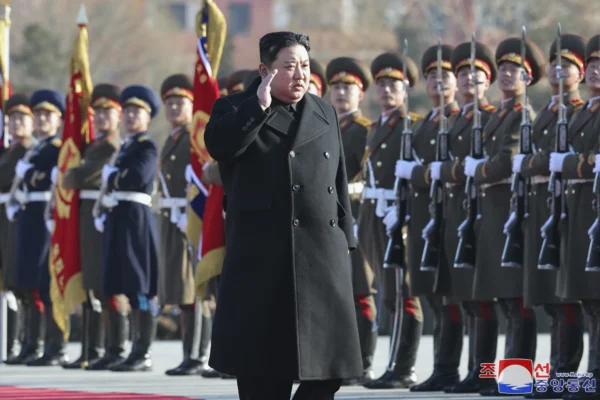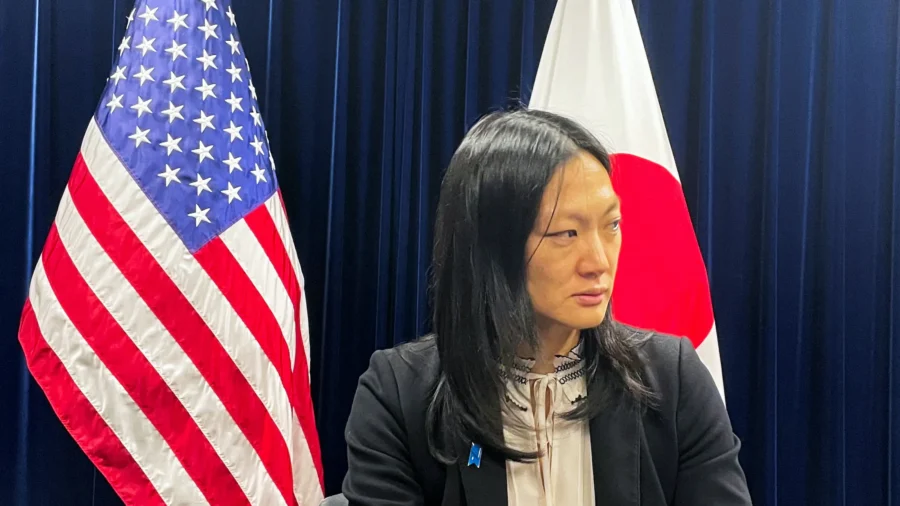The U.S. said it supports Japan’s push for dialogue with North Korea, with desirable topics for discussion being regional security and human rights.
Washington’s envoy on North Korean human rights issues, Julie Turner, made the comments on Wednesday after Japanese Prime Minister Fumio Kishida told parliament last week he wants to hold a summit with North Korean leader Kim Jong Un and is personally overseeing high-level discussions with Pyongyang.
On Wednesday, Japan’s Fuji TV reported that Mr. Kishida is considering visiting South Korea on March 20. to discuss issues, including North Korea, ahead of the South Korean legislative elections in April.
“I can’t speak on behalf of the Japanese government on how those conversations are going,” Ms. Turner told media on a visit to Tokyo.
“On the U.S. side, we’ve made clear that we are open to dialogue with the North Koreans without preconditions, and so I think that would also apply to our like-minded partners and our close allies,” she said.
Ms. Turner said any dialogue should seek resolution on issues including regional security, human rights, as well as the return of Japanese people abducted by North Korea decades ago—a key focus for Tokyo.
The United States has worked hard to develop a three-way policy coordination on North Korea and other security issues between itself, Japan, and South Korea.
Five abductees were returned to Japan following a summit between former Japanese Prime Minister Junichiro Koizumi and then North Korean leader Kim Jong-il in 2002. The pair also met in 2004, the last face-to-face leadership talks between the countries.
The last leadership talks between the U.S. and North Korea took place under former President Donald Trump. They collapsed in 2019, and the U.S. has sought unsuccessfully to reengage with Pyongyang.
“Getting back to the table is the priority right now so that we can start working through those issues,” Ms. Turner said.
Ms. Turner said the U.S., through its embassy in Beijing, has also been pressing China not to forcibly repatriate North Koreans to Pyongyang, where they would likely face persecution.
Up to 600 North Koreans have “vanished” after being forcibly deported by China in October, according to a Seoul-based human rights group which warned they may face imprisonment, torture, sexual violence, and execution.
China “has and continues to hold to the argument that these individuals are economic migrants,” she said.
She said the U.S. is also growing concerned about new groups of North Korean workers being sent overseas.
“We certainly have concerns over Russia. There are many that still remain in China as well,” she said.
A 2017 U.N. Security Council resolution demanded that countries repatriate all North Korean workers by December 2019, saying their labor was exploited to earn foreign currency for North Korea’s banned nuclear and ballistic missile programs.
Given its stance toward South Korea, whether North Korea would accept having talks with Japan is unclear. North Korean leader Kim Jong Un restated in February he has no desire for diplomacy with South Korea and that the North would annihilate its rival if provoked.

Tensions on the Korean Peninsula have increased in recent months, with Kim elevating his weapons demonstrations and threats, and the United States, South Korea, and Japan strengthening their combined military exercises in response.
While most South Korean officials and experts have downplayed the possibility that Kim has real intent to engage in a war, concerns about a direct military provocation have grown as the North may try to ramp up pressure in an election year in South Korea and the United States.
The North’s official Korean Central News Agency reported Kim said he took the initiative to “shake off the unrealistic pretense of dialogue and cooperation with the (South) Korean puppets who sought the collapse of our republic.”
Kim’s remarks came weeks after he declared to his rubber-stamp parliament that North Korea was abandoning its long-standing objective of a peaceful unification with South Korea and ordered the rewriting of its constitution to cement the South as its most hostile foreign adversary.
Experts say Kim’s attempts to recalibrate relations with the South, which come amid a testing spree of potentially nuclear-capable weapons targeting neighboring rivals and the United States, are aimed at reducing Seoul’s voice and eventually forcing direct negotiations with Washington over the nuclear standoff. His long-term goal is to force the United States to accept the idea of the North as a nuclear power and negotiate security and economic concessions from a position of strength.
In a pre-recorded interview with local television that aired Monday, South Korean President Yoon Suk Yeol described Kim’s government as “irrational” actors who are putting further strain on North Korea’s broken economy by aggressively expanding the country’s collection of nuclear weapons and missiles.
“We need to keep that in mind as we prepare to counter their security threats or provocations, preparing not just for actions based on rational judgments but also actions based on irrational conclusions,” Mr. Yoon said.
Reuters and The Associated Press contributed to this report.

